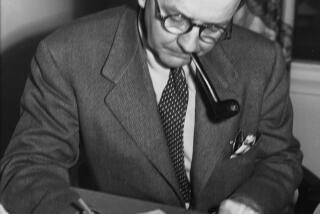We Can’t Stop Loving You
- Share via
Ray Charles will pass by his recording studios one last time today when his funeral cortege leaves this morning’s private service at First AME Church. RPM International, for 40 years his musical home on Washington Boulevard near Western Avenue, was named an official city historic landmark in April. Charles, of course, had achieved monument status long before that.
Like so many others who called Los Angeles home, he found his way here from somewhere else. Even in this city of immigrants, few have traveled farther than he had when he died last week at 73 in his Beverly Hills home. Born in Albany, Ga., during the Depression and raised in Greenville, Fla., Charles described his childhood poverty in his autobiography. “Even compared to other blacks,” he wrote, “we were at the bottom of the ladder looking up at everyone else. Nothing below us except the ground.”
Doctors later speculated that it was glaucoma that began stealing his sight at the age of 5, leaving him blind by 7. Charles always connected the loss to having witnessed his little brother drown in a washtub.
Bitterness never found its way into his music, but something else did. Soul, he once said, was “a way of life, but it was always the hard way.”
An orphan at 15, Charles toured the South in dance-hall bands at 17, having learned to play piano and to read and write music in Braille. He recorded his first singles in Seattle and moved to Los Angeles in 1950. The hits started five years later and never stopped.
Tributes have poured in for the last week from Quincy Jones, Brian Wilson, Van Morrison, Willie Nelson and other musicians, some of whom will sing at today’s funeral. At Thursday’s public viewing at the Los Angeles Convention Center, regular folks came in ball caps and fedoras to say goodbye to the man in the tuxedo and trademark dark glasses. Some were drawn by his musical genius and influence. Others came to salute both the music and the man who overcame poverty, blindness and prejudice -- he toured for years eating sandwiches served at restaurants’ back doors. Any one of these challenges might have overwhelmed someone with less grit and grace.
The man who sang gospel, rhythm and blues, pop, rock, jazz and country was to music what his adopted hometown is to language: a polyglot. Like this multi-everything city, his music was an extension of an evolving America. Among the many tributes to Charles on the Web this week are frequent references to the late Flip Wilson’s Christopher Columbus sketch, with the comedian as Queen Isabella saying: “Chris gonna’ find America. Chris gonna find Ray Charles!”
It turned out they were the same thing.
More to Read
The biggest entertainment stories
Get our big stories about Hollywood, film, television, music, arts, culture and more right in your inbox as soon as they publish.
You may occasionally receive promotional content from the Los Angeles Times.










